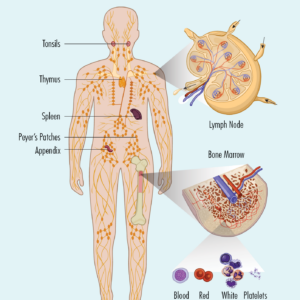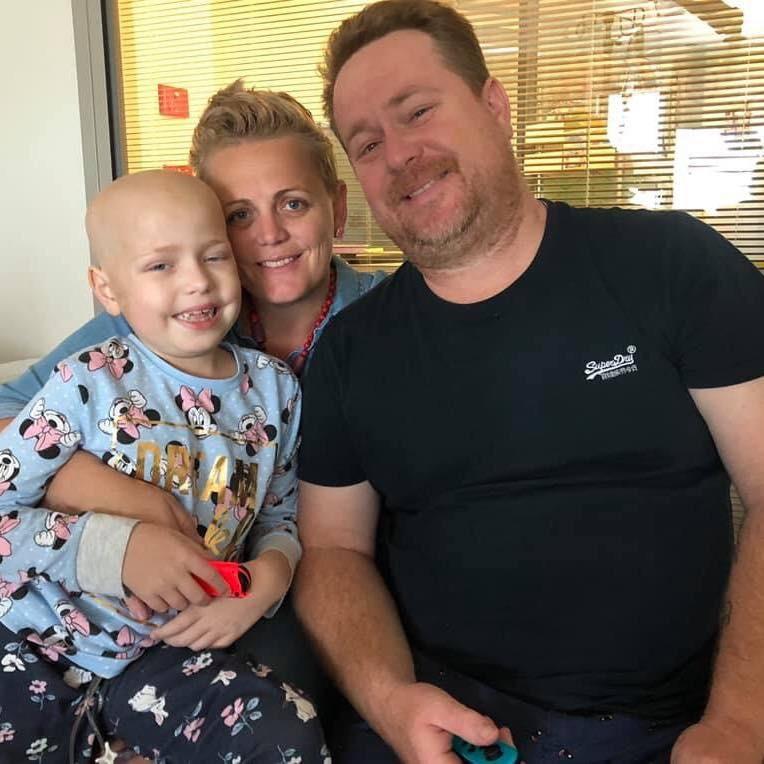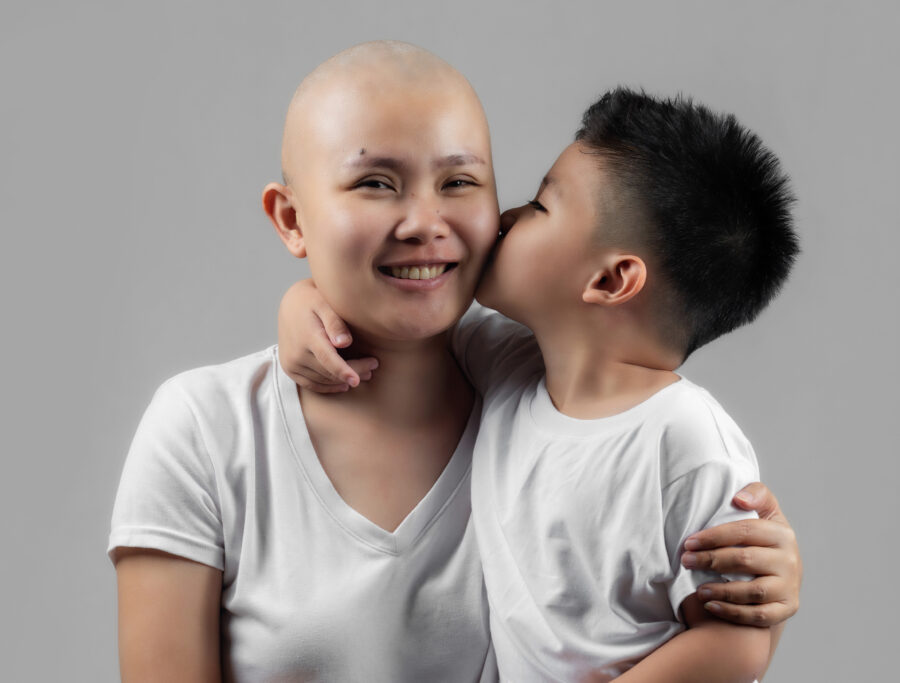
Lymphoma is a rare childhood illness with only about 100 children in Australia being diagnosed each year. However, despite being rare, it the third most common cancer in children, adolescents and young adults.
Many young people, even with advanced lymphoma can be cured after standard first-line treatments.
Lymphomas are a group of cancers of a type of white blood cell called lymphocytes, that live mostly in our lymphatic system. They develop when lymphocytes, which are a type of white blood cell, develop DNA mutations which causes them to divide and grow uncontrollably, resulting in lymphoma. There are two main types of lymphoma, Hodgkin lymphoma and non-Hodgkin lymphoma (NHL).
Lymphoma can be further divided into:
- Indolent (slow growing) lymphoma
- Aggressive (fast-growing) lymphoma
- B-cell lymphoma develop from abnormal B-cell lymphocytes & are the most common, accounting for around 85% of all lymphomas (all ages)
- T-cell lymphoma develop from abnormal T-cell lymphocytes and account for around 15% of all lymphomas (all ages).

What is the cause
In most cases of lymphoma, the cause is not known. Unlike other cancers, we don’t know of any life-style choices that result in lymphoma, so there is nothing you have done or haven’t done that has caused you (or your child) to get lymphoma. It is not infectious and cannot be passed onto other people. What we do know is that special proteins or genes are damaged (become mutated) and then grow uncontrollably.
Where do young people get treatment?
Most children will be treated at a specialist children’s hospital however, young people aged 15-18 years can be referred by their GP to either a Children’s (paediatric) hospital or an adult hospital. Young people over 18 years will normally be treated in an adult hospital.
Some treatments may mean you need to stay in hospital, while other treatments may be given in day unit setting where you have your treatment, and then go home on the same day.
Types of lymphoma young people get
There are two main types of lymphoma, Hodgkin lymphoma and non-Hodgkin lymphoma (NHL).

Hodgkin lymphoma (HL)
Hodgkin lymphoma is rare in children less that 5 years of age, but is more common in adolescents and young adults. However, it can affect people of all ages including babies and older adults.
It is an aggressive cancer of B-cell lymphocytes and one of the most common types of cancer children get. Of all children aged 0-14 years with lymphoma, about 4 in every 10 will have a subtype of Hodgkin Lymphoma.
The two main subtypes of Hodgkin lymphoma (HL) are:
- Classical Hodgkin lymphoma: the more common subtype of Hodgkin lymphoma and is characterised by the presence of large, abnormal Reed-Sternberg cells.
- Nodular lymphocyte predominant Hodgkin lymphoma: which involves variants of Reed-Sternberg cells called ‘popcorn’ cells. The popcorn cells often have a protein on them called CD20, which Classical Hodgkin Lymphoma does not have.
Non-Hodgkin lymphoma (NHL)
NHL can be either aggressive (fast growing) or indolent (slow growing) in behaviour and happens when either your B-cell or T-cell lymphocytes become cancerous.
There are about 75 different subtypes of non-Hodgkin lymphoma. The 4 most commonly seen in children are listed below, you can click on them to find more information.
- Paediatric Diffuse Large B-cell Lymphoma (DLBCL)
- Paediatric Burkitt’s Lymphoma
- Paediatric Lymphoblastic Lymphoma
- Paediatric Anaplastic Large Cell Lymphoma (ALCL)
Prognosis of lymphoma in young people
The prognosis is very good for most young people with lymphoma. Many young people with lymphoma can be cured with standard treatment that includes chemotherapy, even when they are first diagnosed with an aggressive or advanced lymphoma. To learn more about prognosis for different types of lymphoma in young people, please see the subtype pages listed above.
Sadly a small number of young people do not respond as well to treatments. Ask your doctor (or your child’s doctor) about what to expect and how likely it is that your lymphoma will be cured.
Long-term survival and treatment options depend on a range of factors, including:
- your age when you are first diagnosed with lymphoma.
- the stage of the lymphoma.
- what subtype of lymphoma you have.
- how the lymphoma responds to treatment.
Watch - Unique needs of adolescents and young adults with lymphoma
Hear from Dr Orly – Haematologist at St Vincents Sydney talk about the unique needs of adolescents and young adults with lymphoma
Treatment for lymphoma
You (or your child) will need treatment and that may include chemotherapy (often including immunotherapy) and sometimes radiation therapy too. Depending on the type of lymphoma, different chemotherapy agents are used for different types of lymphoma.
The doctors will take into consideration many factors about the lymphoma and general health of your child to decide when and what treatment is required. This is based on:
- The stage of lymphoma.
- Symptoms you have when you are diagnosed with lymphoma.
- Whether you have any other illnesses or are taking other medications.
- Your general health including your physical and mental wellbeing.
- Your preferences (or your parents) after you have all the information you need.
Fertility Preservation
Patient stories
Information and supports for parents and caregivers
If you are a parent or carer of a child who has been diagnosed with lymphoma, it can be a stressful and emotional experience. There is no right or wrong reaction.
It is important to allow yourself and your family time to process and acknowledge the diagnosis. It is also important that you do not carry the weight of this diagnosis on your own as there are a number of support organisations that are here to help you and your family during this time.
You can always contact our Lymphoma Care Nurses by clicking the contact us button at the bottom of this page.
Other resources you may find helpful are listed below:
School and tutoring
If your child is school aged you may be worried about how they will keep up with school while having treatment. Or perhaps , you have been so busy with everything going on that you haven’t even had a chance to think about it.
Your other children may also miss school if your family has to travel distances and stay away from home while your child with lymphoma is in hospital.
But thinking about schooling is important. Most children with lymphoma can be cured and will need to return to school at some point. Many major children’s hospitals have a tutoring service or school that you child with lymphoma and your other children can attend while your child is having treatment or in hospital.
The below major hospitals have a school services within their service. If your child is having treatment at a different hospital than those listed here, ask them about schooling support is available for your child/ren.
QLD. – Queensland Children’s Hospital School (eq.edu.au)
VIC. – Victoria, Education Institute: Education Institute (rch.org.au)
S.A. – Hospital School of South Australia’s hospital education programs
W.A. – School in hospital (health.wa.gov.au)
N.S.W. – School in hospital | Sydney Children’s Hospitals Network (nsw.gov.au)
Summary
- Lymphoma is the 3rd most common cancer in children, and the most common cancer in adolescents and young adults.
- Treatments have improved greatly over the years and many young people with lymphoma can be cured.
- There are different types of treatment and the treatment you get will depend on the subtype and stage of your lymphoma.
- Ask your doctor about how to preserve your fertility so you can have babies later in life. Ask about this before you start treatment.
- Side-effects can happen soon after treatment or years later. Be sure to check out our side-effects page.
- Report all new and worsening symptoms to your doctor.
- Call our Lymphoma Care Nurses on 1800 953 081 if you want to talk about your, or your child’s lymphoma or treatments.

